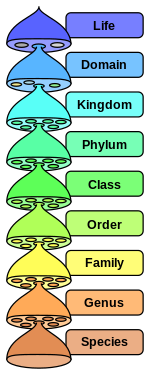
Back Domein (biologie) Afrikaans Domäne (Biologie) ALS Dominio (biolochía) AN نطاق (تصنيف) Arabic ضومين (بيولوجيا) ARY সাম্ৰাজ্য (জীৱ বিজ্ঞান) Assamese Dominiu (bioloxía) AST Домен (биология) Bashkir Domän (Biologie) BAR Дамен (біялогія) Byelorussian

In biological taxonomy, a domain (/dəˈmeɪn/ or /doʊˈmeɪn/) (Latin: regio[1]), also dominion,[2] superkingdom, realm, or empire, is the highest taxonomic rank of all organisms taken together. It was introduced in the three-domain system of taxonomy devised by Carl Woese, Otto Kandler and Mark Wheelis in 1990.[1]
According to the domain system, the tree of life consists of either three domains, Archaea, Bacteria, and Eukarya,[1] or two domains, Archaea and Bacteria, with Eukarya included in Archaea.[3][4] In the three-domain model, the first two are prokaryotes, single-celled microorganisms without a membrane-bound nucleus. All organisms that have a cell nucleus and other membrane-bound organelles are included in Eukarya and called eukaryotes.
Non-cellular life, most notably the viruses, is not included in this system. Alternatives to the three-domain system include the earlier two-empire system (with the empires Prokaryota and Eukaryota), and the eocyte hypothesis (with two domains of Bacteria and Archaea, with Eukarya included as a branch of Archaea).
- ^ a b c Woese C, Kandler O, Wheelis M (1990). "Towards a natural system of organisms: Proposal for the domains Archaea, Bacteria, and Eucarya". Proc Natl Acad Sci USA. 87 (12): 4576–4579. Bibcode:1990PNAS...87.4576W. doi:10.1073/pnas.87.12.4576. PMC 54159. PMID 2112744.
- ^ Cite error: The named reference
Moore1974was invoked but never defined (see the help page). - ^ Nobs, Stephanie-Jane; MacLeod, Fraser I.; Wong, Hon Lun; Burns, Brendan P. (2022). "Eukarya the chimera: Eukaryotes, a secondary innovation of the two domains of life?". Trends in Microbiology. 30 (5): 421–431. doi:10.1016/j.tim.2021.11.003. PMID 34863611. S2CID 244823103.
- ^ Doolittle, W. Ford (2020). "Evolution: Two domains of life or three?". Current Biology. 30 (4): R177–R179. doi:10.1016/j.cub.2020.01.010. PMID 32097647.